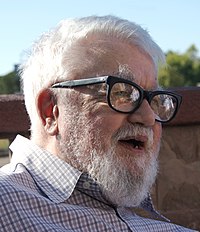John McCarthy
| John McCarthy | |
|---|---|
 | |
| Conhecido(a) por | Lisp |
| Nascimento | 4 de setembro de 1927 Boston |
| Morte | 23 de outubro de 2011 (84 anos) |
| Nacionalidade |  Estadunidense Estadunidense |
| Alma mater | Universidade de Princeton, Instituto de Tecnologia da Califórnia |
| Prêmios | Prêmio Turing (1971), Prêmio Pioneiro da Computação (1985), Prêmio Kyoto (1988), Medalha Nacional de Ciências (1990), Medalha Benjamin Franklin (2003) |
| Orientador(es)(as) | Solomon Lefschetz[1] |
| Orientado(a)(s) | Ruzena Bajcsy, Ramanathan Guha, Barbara Liskov, Raj Reddy |
| Instituições | Universidade Stanford, Instituto de Tecnologia de Massachusetts, Dartmouth College, Universidade de Princeton |
| Campo(s) | Ciência da computação |
John McCarthy (Boston, 4 de setembro de 1927 — Stanford, Califórnia, 23 de outubro de 2011[2]) foi um cientista da computação estadunidense.
Conhecido pelos estudos no campo da inteligência artificial e por ser o criador da linguagem de programação Lisp. Recebeu o Prêmio Turing de 1972 e a Medalha Nacional de Ciências dos Estados Unidos de 1991.[3]
Publicações selecionadas
- McCarthy, J. 1959. Programs with Common Sense. In Proceedings of the Teddington Conference on the Mechanization of Thought Processes, 756-91. London: Her Majesty's Stationery Office.
- McCarthy, J. 1960. Recursive functions of symbolic expressions and their computation by machine. Communications of the ACM 3(4):184-195.
- McCarthy, J. 1963a A basis for a mathematical theory of computation. In Computer Programming and formal systems. North-Holland.
- McCarthy, J. 1963b. Situations, actions, and causal laws. Technical report, Stanford University.
- McCarthy, J., and Hayes, P. J. 1969. Some philosophical problems from the standpoint of artificial intelligence. In Meltzer, B., and Michie, D., eds., Machine Intelligence 4. Edinburgh: Edinburgh University Press. 463-502.
- McCarthy, J. 1977. Epistemological problems of artificial intelligence. In IJCAI, 1038-1044.
- McCarthy, J. 1980. Circumscription: A form of non-monotonic reasoning. Artificial Intelligence 13(1-2):23-79.
- McCarthy, J. 1986. Applications of circumscription to common sense reasoning. Artificial Intelligence 28(1):89-116.
- McCarthy, J. 1990. Generality in artificial intelligence. In Lifschitz, V., ed., Formalizing Common Sense. Ablex. 226-236.
- McCarthy, J. 1993. Notes on formalizing context. In IJCAI, 555-562.
- McCarthy, J., and Buvac, S. 1997. Formalizing context: Expanded notes. In Aliseda, A.; van Glabbeek, R.; and Westerstahl, D., eds., Computing Natural Language. Stanford University. Also available as Stanford Technical Note STAN-CS-TN-94-13.
- McCarthy, J. 1998. Elaboration tolerance. In Working Papers of the Fourth International Symposium on Logical formalizations of Commonsense Reasoning, Commonsense-1998.
- Costello, T., and McCarthy, J. 1999. Useful counterfactuals. Electronic Transactions on Artificial Intelligence 3(A):51-76
- McCarthy, J. 2002. Actions and other events in situation calculus. In Fensel, D.; Giunchiglia, F.; McGuinness, D.; and Williams, M., eds., Proceedings of KR-2002, 615-628.
Referências
- ↑ John McCarthy (em inglês) no Mathematics Genealogy Project
- ↑ Morre John McCarthy, pioneiro da Inteligência Artificial e pai do Lisp
- ↑ «Morre John McCarthy, criador do termo 'inteligência artificial'». Folha.com. 24 de outubro de 2011. Consultado em 25 de outubro de 2011
Ligações externas
- Literatura de e sobre John McCarthy (em alemão) no catálogo da Biblioteca Nacional da Alemanha
- John McCarthy (em inglês) no Mathematics Genealogy Project
| Precedido por James Hardy Wilkinson | Prêmio Turing 1971 | Sucedido por Edsger Dijkstra |
 Portal das tecnologias de informação
Portal das tecnologias de informação Portal dos Estados Unidos
Portal dos Estados Unidos
 | Este artigo sobre um(a) cientista da computação é um esboço. Você pode ajudar a Wikipédia expandindo-o.
|











